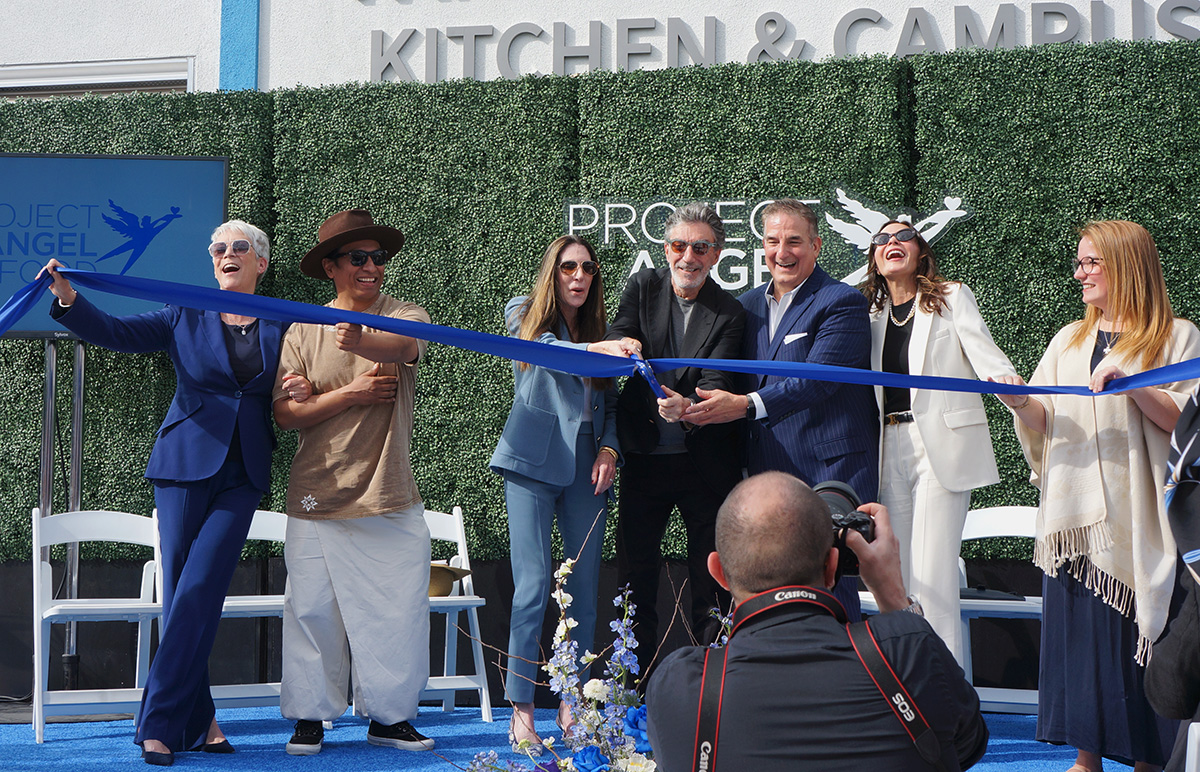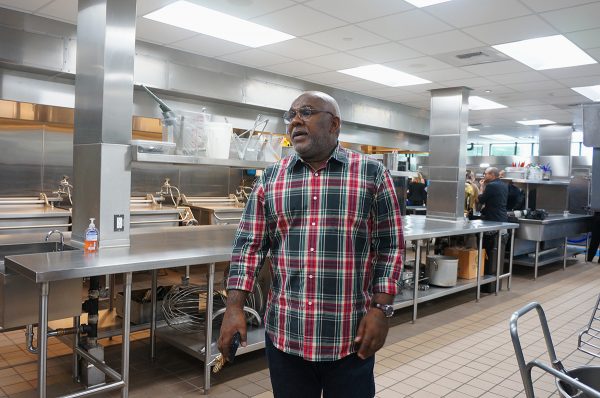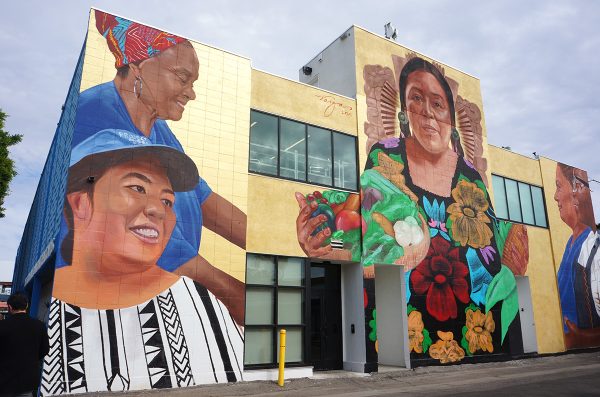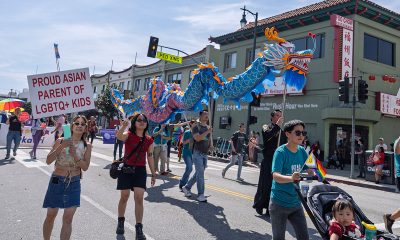News
All of Trump’s anti-LGBT actions since last Pride (plus a few welcome moves)
Acts against LGBT people far outweigh beneficial policy


President Donald Trump (Photo public domain)
President Trump acknowledged Pride month via Twitter last week, but his well wishes for the LGBT community fell on skeptical ears following the extensive anti-LGBT actions of his administration.
In just the year since last Pride, the tally of anti-LGBT actions from the Trump administration dwarf the number of good things that have come from his presidency for the LGBT community.
With Pride celebrations underway, the Blade presents a list in no particular order of Trump’s positive and negative actions with direct impact on the LGBT community since 2018’s Pride celebration.
(-) 1. Embracing the Masterpiece Cakeshop decision
When the U.S. Supreme Court issued a narrow ruling last year in favor of Colorado baker Jack Phillips, many observers saw the decision as limited. After all, justices declined to find the First Amendment right Phillips asserted to refuse to make custom-made wedding cakes for same-sex couples.
But the Trump administration fully embraced the decision as a win for “religious freedom.” White House Press Secretary Sarah Huckabee Sanders said the court “rightly concluded” the Colorado Civil Rights Commission “failed to show tolerance and respect” for Phillips’ religious beliefs.
Soon after, the Labor Department issued guidance to ensure enforcement of LGBT non-discrimination rules complied with the ruling’s deference to religious freedom, even though the Trump administration wasn’t required to take that action.
(-) 2. White House meeting with Ginni Thomas
President Trump continues to meet with anti-LGBT activists in the White House, including a recent high-profile discussion with Ginni Thomas, the wife of conservative U.S. Associate Justice Clarence Thomas.
The New York Times reported Trump met in January with anti-LGBT activists led by Thomas in the Roosevelt Room of the White House. As Trump was reportedly “listening quietly,” members of the group denounced transgender people serving in the U.S. military.
In addition to decrying transgender military service, the anti-LGBT activists said women shouldn’t serve in the military “because they had less muscle mass and lung capacity than men.” They also said the Supreme Court ruling for marriage equality is “harming the fabric of the United States” and sexual assault isn’t pervasive in the military, according to the New York Times.
(-) 3. Coming out against the Equality Act
In the same week the U.S. House voted to approve the Equality Act, legislation that would amend the Civil Rights Act of 1964 to ban anti-LGBT discrimination, Trump came out against the bill.
In an exclusive statement to the Blade, a senior administration official said Trump opposes the Equality Act based on unspecified “poison pill” amendments to the legislation.
“The Trump administration absolutely opposes discrimination of any kind and supports the equal treatment of all; however, this bill in its current form is filled with poison pills that threaten to undermine parental and conscience rights,” the official said via email.
(+) 4. AIDS advisory council restaffed
One year after firing all members of the Presidential Advisory Council on HIV/AIDS without explanation as first reported by the Blade, Trump restaffed the advisory body with 11 new appointees.
Carl Schmid, deputy director of the AIDS Institute, and John Wiesman, secretary of health in Washington State, were named as co-chairs for the advisory council. Months later, the Department of Health & Human Services named nine additional members to PACHA from a variety of professions, including the pharmaceutical industry, activism and academia.
(-) 5. Trans military ban implemented
After the U.S. Supreme Court essentially green lighted Trump’s ban on transgender people in the military, the Defense Department implemented the policy in April.
Denying the transgender ban is, in fact, a ban, the policy prohibits anyone who has undergone gender reassignment surgery from enlisting in the military and requires anyone who identifies as transgender to serve in their biological sex (which would be a small number of transgender people.) Although transgender people who were already serving openly won an exemption, individuals who are diagnosed in the future with gender dysphoria or obtain transition-related care would be discharged.
(-) 6. Brief against trans protections under Title VII
In a brief urging the U.S. Supreme Court not to take up a case seeking clarification on whether anti-trans discrimination is a form of sex discrimination under federal law, the Trump administration asserted the U.S. Sixth Circuit Court of Appeals wrongly decided transgender people have protections under Title VII of the Civil Rights Act.
“The court of appeals’ conclusion that gender-identity discrimination categorically constitutes sex discrimination under Title VII is incorrect,” the filing says. “As discussed above, the ordinary meaning of ‘sex’ does not refer to gender identity…The court’s position effectively broadens the scope of that term beyond its ordinary meaning. Its conclusion should be rejected for that reason alone.”
(-) 7. List of anti-LGBT appointments grows
The U.S. Senate continues to confirm Trump’s appointments, many of whom have long anti-LGBT records. The latest will reportedly be former Virginia Attorney General Ken Cuccinelli, who once said homosexual acts are “against nature and are harmful to society,” for a position at the Department of Homeland Security
Other confirmations include U.S. District Judge Howard Nielson of Utah, who as an attorney argued a gay judge shouldn’t be able to decide the case against California’s Proposition 8, and U.S. District Judge Chad Readler of Ohio, who as acting assistant U.S. attorney general penned his name to briefs in favor of the transgender military ban and against LGBT protections under Title VII.
(+) 8. But a few are from the LGBT community
A handful of Trump’s appointments are from the LGBT community. Among them is former Log Cabin Republicans executive director R. Clarke Cooper, whom Trump appointed to a senior position at the State Department for political-military affairs. The Senate confirmed Cooper in April.
Other new LGBT appointments are Mary Rowland, a lesbian with ties to the LGBT group Lambda Legal whom Trump named to a federal judgeship in Illinois; and Patrick Bumatay, a gay federal prosecutor whom Trump named for a seat on the U.S. District Court for the Southern District of California. Both nominations are pending before the Senate.
(-) 9. Draconian anti-trans memo leaked
An explosive report in the New York Times last year exposed a planned memo within the Department of Health & Human Services that would effectively erase transgender people from federal law, igniting a massive outcry among transgender rights supporters.
The proposal reportedly asserts Title IX of the Education Amendments of 1972, which bars sex discrimination in schools, doesn’t apply to transgender people and calls for government agencies to adopt an explicit and uniform definition of sex “on a biological basis that is clear, grounded in science, objective and administrable.” A dispute about one’s sex, the New York Times reported, would have to be clarified using genetic testing.
(-) 10. Anti-trans ‘conscience rule’ is final
The memo as described by the Times never came to light, but months later HHS did implement an anti-trans “conscience rule” allowing health care providers to opt out of procedures over which they have religious objections, including abortions or gender reassignment surgery.
Trump announced the rule was final during a speech in the White House Rose Garden on the National Day of Prayer.
(-) 11. HHS seeks to undo trans health rule
HHS wasn’t done. Weeks after the conscience rule was final, the department announced a proposed rule seeking to undo regulations in health care against anti-trans discrimination.
The Obama-era regulations asserted Section 1557 of the Affordable Care Act, which bars sex discrimination in health care, also covers discrimination on the basis of gender identity. Under the Trump rule, HHS would disavow those protections. (The Obama-era rule was already enjoined by a federal judge.)
(-) 12. Ending visas for unmarried partners of diplomats
The State Department last year cancelled visas for the unmarried same-sex partners of diplomats to the United States.
By canceling these visas for these partners, the State Department forced these partners to either marry or get out, which complicated matters if these diplomats are from countries where same-sex marriage isn’t legal. At the time of the decision, only 25 countries recognized same-sex marriage.
(-) 13. Proposal to gut trans protections at homeless shelters
Despite assurances from Secretary of Housing & Urban Development Ben Carson LGBT non-discrimination rules for federally funded housing would remain in place, HUD has proposed a rule that would gut transgender protections at homeless shelters.
The HUD proposal would allow homeless shelters with sex-segregated facilities — such as bathrooms or shared sleeping quarters — to establish policy consistent with state and local laws in which operators consider a range of factors when determining where to place individuals looking to stay, including “religious beliefs.”
(+) 14. Trump announces HIV plan in State of the Union
Trump in his State of the Union address announced an initiative to end the HIV epidemic by 2030, asserting “remarkable progress in the fight against HIV and AIDS” in recent years.
“Scientific breakthroughs have brought a once-distant dream within reach,” Trump said. “My budget will ask Democrats and Republicans to make the needed commitment to eliminate the HIV epidemic in the United States within 10 years. We have made incredible strides. Incredible. Together, we will defeat AIDS in America and beyond.”
The plan seeks to reduce new HIV diagnoses by 75 percent within five years, and by 90 percent within 10 years. Efforts will focus on 48 counties, D.C., and San Juan, Puerto Rico and seven states where the epidemic is mostly in rural areas.
(+) 15. And the budget follows through with that request
Trump’s budget request for fiscal year 2020 made good on his pledge in the State of the Union address, seeking $300 million in new funds for domestic HIV programs.
The bulk of the $300 million figure is an additional $140 million requested for HIV prevention at the Centers for Disease Control & Prevention, which is a 19 percent increase in its overall budget from fiscal year 2019. The rest is $70 million for the Ryan White Health Care Program, $50 million for PrEP services at HRSA centers and $25 million to screen for HIV and treat Hepatitis C.
(-) 16. But NIH and global AIDS programs slashed
But the same budget sought to slash funds for the National Institutes for Health, which conducts HIV research, and global AIDS programs like PEPFAR. Moreover, the plan sought to make Medicaid a block-grant program, even though 40 percent of people with HIV rely on it. Congress ended up rejecting the cuts, fully funding NIH and global AIDS programs.
(-) 17. Giving Pete Buttigieg nickname of ‘Alfred E. Neuman’
Consistent with his track record of giving his political opponents nicknames, Trump gave an unflattering moniker to Pete Buttigieg, the gay presidential candidate with growing support in the Democratic primary.
Trump dubbed him “Alfred E. Neuman,” the Mad Magazine character famous for the phrase, “What Me Worry?” In a dog whistle that perhaps gay people could hear, Trump said, “Alfred E. Neuman cannot become president of the United States.”
(+) 18. Recognizing global initiative to end anti-gay laws
In his tweet recognizing June as Pride Month, Trump also acknowledged his global initiative to decriminalize homosexuality. Currently, same-sex relations are illegal in 71 countries.
The project is spearheaded by U.S. Ambassador to Germany Richard Grenell, the highest-ranking openly gay person in the Trump administration.
Previously, Trump seemed unaware of the project. Asked about it by reporters, Trump said, “I don’t know which report you’re talking about. We have many reports.”
(-) 19. No State Dept. recognition of Pride Month, IDAHO
In contrast to Trump, the State Department in 2019 issued no statement recognizing Pride Month, nor weeks before did it recognize the International Day Against Homophobia & Transphobia.
In 2018, Secretary of State Mike Pompeo issued statements recognizing Pride Month and IDAHO. Coming off a confirmation process in which he was criticized as homophobic, Pompeo said “too many governments continue to arrest and abuse their citizens simply for being lesbian, gay, bisexual, transgender or intersex.”
(-) 20. Refusing to recognize birthright of child to gay couple
Consistent with the policy of cracking down on immigration, the Trump administration refused to recognize the birthright citizenship of the son of U.S.-citizen Andrew Dvash-Banks and his Israeli husband Elad Dvash-Banks.
The couple had two twin boys conceived via a surrogate mother in Canada. The State Department, however, required a DNA test to prove the children were related to the couple to provide them U.S. passports. One child, Aiden, was deemed a citizen because he’s the biological son of Andrew, but the other, Ethan, wasn’t because he’s the biological son of Elad.
(-) 21. And appealed a court ruling for the couple
When the couple sued the Trump administration, a court sided with the couple in granting birthright citizenship to Ethan.
However, the State Department refused to accept the decision and appealed the ruling to the U.S. Ninth Circuit Court of Appeals, where the case remains pending. A mediation document reveals the State Department insists on its policy of “a biological relationship between a U.S. citizen parent and a child born outside the United States” to grant citizenship.
(-) 22. LGBT protections watered-down in USMCA
An initial version of the USMCA trade agreement with Canada and Mexico contained at the behest of Canadian Prime Minister Justin Trudeau language a call for countries to adopt policies “against sex-based discrimination, including on the basis of sexual orientation and gender identity.”
But Trudeau publicly buckled when asked about his commitment. After additional negotiations with the Trump administration, a footnote was added to USMCA stating Title VII in the United States, which bars discrimination on the basis of sex in the workforce, was sufficient to meet the requirements of the deal.
(-) 23. DOJ’s ‘Religious Liberty Task Force’
Before he was sacked by Trump, former U.S. Attorney General Jeff Sessions held a summit at the Justice Department on religious freedom featuring Masterpiece Cakeshop’s Jack Phillips and Catholic leaders.
At the summit, Sessions established the Religious Liberty Task Force. The goal of the task force was to ensure his memo on “religious freedom” — widely seen as guidance in support of anti-LGBT discrimination — was being implemented throughout the federal government.
(+) 24. Hailing PrEP deal with Truvada as ‘great news’
The Department of Health & Human Services reached a deal with Gilead to make PrEP available for generic production one year earlier and to secure a donation of the medication for up to 200,000 individuals each year for up to 11 years.
Trump took to Twitter to hail the agreement: “Great news today: My administration just secured a historic donation of HIV prevention drugs from Gilead to help expand access to PrEP for the uninsured and those at risk. Will help us achieve our goal of ending the HIV epidemic in America!”
(-) 25. Deleting trans employee guidance on OPM website
In a little-noticed development over the holidays, guidance on the Office of Personnel Management’s website for federal workers who are transgender was deleted without explanation.
The Obama-era guidance spelled out the definition of terms for transgender identities and expectations for respecting transgender workers. The guidance ensured transgender people could dress according to their gender identity, be addressed by their preferred gender pronouns and use restrooms and locker rooms consistent with their gender identity.
(+) 26. U.S. joins OSCE in calling for Chechnya investigation
Under the Trump administration, the United States joined 15 allied countries at the U.S. Organization for Security & Cooperation in Europe in the creation of a probe to investigate alleged anti-gay human rights abuses in Chechnya.
The report concluded, as the United States and human rights organizations long believed, Chechen government officials engaged in human rights violations, including “harassment and persecution, arbitrary or unlawful arrests or detentions, torture, enforced disappearances and extrajudicial executions.” Victims were LGBT people, human rights defenders, journalists and members of civil society.
(-) 27. But U.S. didn’t sign U.N. statement against atrocities
Months later, the United States was nowhere to be found on a United Nations statement signed by more than 30 countries calling for a thorough investigation of the Chechnya atrocities. The State Department said the United States didn’t sign because it withdrew from the U.N. Human Rights Council “and no longer participates in its sessions.”
(-) 28. State Department proposes ‘natural law’ commission
LGBT rights supporters are viewing with skepticism a State Department proposal to create a “natural law” commission, which is set to “provide fresh thinking about human rights discourse where such discourse has departed from our nation’s founding principles of natural law and natural rights.”
The term “natural law” has been used to express condemnation of LGBT identities in religious discourse.
(-) 29. Eliminating LGBT youth data question in foster care
The Trump administration has proposed eliminating requirements for case workers to ask LGBT youth in foster care about their sexual orientation of youth for data collection purposes.
Although the Department of Health & Human Services concluded it was “intrusive and worrisome,” LGBT rights advocates say the questions are necessary to ascertain disparities facing LGBT youth in the foster care and adoption systems.
(-) 30. Trump stands with anti-LGBT adoption agencies
In a speech at the National Prayer Breakfast, Trump expressed solidarity with religious-affiliated adoption agencies, who are bristling over LGBT non-discrimination requirements to obtain federal funding.
“My administration is working to ensure that faith-based adoption agencies are able to help vulnerable children find their forever families while following their deeply held beliefs,” Trump said.
(-) 31. And defends Karen Pence teaching at anti-LGBT school
In the same speech, Trump also defended second lady Karen Pence for her decision to teach art at a Christian school in Virginia, which has a policy against employing LGBT teachers or admitting LGBT students.
“She just went back to teaching art classes at a Christian school,” Trump said, “Terrific woman.”
Los Angeles
A new “queer summer camp” cycling event rises from the legacy of AIDS/LifeCycle
The LA LGBT Center will host its first ever “Center Ride Out,” a 3-day community cycling adventure from Los Angeles to San Diego.

On April 24, 500 cyclists will meet at Elysian Park before dawn, stretching and preparing for a 110-mile ride through urban scenery and rolling hills. They will be part of the Los Angeles LGBT Center’s inaugural “Center Ride Out,” a 3-day journey that takes riders through Los Angeles and Temecula, reeling to a stop at the San Diego LGBT Community Center.
The cycling adventure is a rejuvenating, communal queer experience that taps into the importance of shared joy and advocacy in the fight to defend LGBTQ+ rights. Its roots are sacred for many queer elders: Center Ride Out rises from the legacy of the cherished AIDS/Life Cycle (ALC), a seven-day cycling adventure from San Francisco to L.A. that formed in 1994 and ended with its last ride in 2025.
In its 31-year run, ALC riders raised over $300 million for HIV and AIDS resources, services, and awareness. This year, Center Ride Out provides a new, exciting extension of this important event, allowing cyclers to raise funds in support of the LA LGBT Center, The San Diego LGBT Community Center, and the LGBTQ Community Center of the Desert.
This support is crucial as LGBTQ+ organizations face a new crisis: widespread defunding. In the last fiscal year, the LA LGBT Center lost $9 million in federal support, according to its CEO Joe Hollendoner. The funding raised by Center Ride Out’s participants will help offset this loss and keep the organization’s various programs and services, from gender affirming care and HIV prevention resources to LGBTQ+ senior and youth support, afloat. “We anticipate further divestment in our work by the Trump administration, [so Center Ride Out] allows people to align their own personal passions with our mission in a broader way,” Hollendoner told the Blade.
Altogether, Center Ride Out participants will cover nearly 200 miles of ground together. At the end of the first 110-mile day from L.A. to Temecula, where riders will get to look at historic landmarks and embark on a museum lunch stop together, the day culminates at campgrounds at Lake Skinner.
Here, riders can take a full rest day at their lakeside camp, where it will exude queer summer camp vibes. There will be massage and medical services, arts and crafts activities, dance parties, and time to relax and connect with the community. “Folks [can] build relationships, have some fun, and feel safe. That’s a feeling a lot of people [need] right now, especially our trans and nonbinary siblings,” Hollendoner said.
Day 3 ends with an 87-mile downhill, coastal ride through the town of Rainbow in northern San Diego County, before ending with a celebratory bash at the San Diego LGBT Community Center.
Hollendoner rode ALC five times while it was active and is excited to be part of this new legacy from its very beginning. “I’ve heard our community elders talk about how powerful it was to be at the start of AIDS/LifeCycle, and the idea that I can be here at the start of Center Ride Out, an event that I hope will go for three decades or longer…It feels really exciting to me,” Hollendoner said.
For newcomers and experienced cyclists alike, Center Ride Out aims to provide an accessible experience: paring down the initial weeklong ALC ride to three days. To take part, cyclists are expected to raise $2,500 by April 10. For those who may struggle to reach this minimum, staff members have established a community fund.
The community fund will also provide scholarships for BIPOC, trans, women, and femme participants — historically underrepresented communities at ALC — as well as microgrants for BIPOC and trans-led teams to encourage a diverse range of cyclists.
Come April, scores of queer cyclists will get to experience this adventure together: one that is both storied and fresh in its purpose, lineage, and joyful expression of queer togetherness. “Center Ride Out is providing an exciting opportunity for people to not only fight back and be in community with one another, but to build resiliency and be surrounded by people who share values around liberation,” Hollendoner said.
To learn how to register, donate to or volunteer for Center Ride Out, more information can be found here. The three-day adventure takes place from April 24 to April 26.
Kristie Song is a California Local News Fellow placed with the Los Angeles Blade. The California Local News Fellowship is a state-funded initiative to support and strengthen local news reporting. Learn more about it at fellowships.journalism.berkeley.edu/cafellows.
Los Angeles
Stonewall Young Democrats bounces back from “quiet year” with Hero Awards

On Saturday, Feb. 7, the Stonewall Young Democrats (SYD), an organization that mobilizes and fosters community for young, LGBTQ+ people, hosted its “Hero Awards” ceremony at Beaches West Hollywood. Under luminous pink light, vibrant crowds of community members showed up to support and celebrate people and organizations spearheading LGBTQ+ visibility, change, and livelihood across L.A. County. Political figures filled the venue wall to wall, including LA Mayor Karen Bass, West Hollywood Mayor John Heilman, West Hollywood Council Member John Erickson, and California Assemblymember Rick Zbur.

Several local advocates and politicians were honored for their queer advocacy and leadership, including City of Los Angeles LGBTQ+ community affairs liaison Carla Ibarra, L.A. Democratic Party Chair Mark Ramos, Congressman Mark Takano, and L.A. County LGBTQ Commission Chair Sydney Rogers. The Los Angeles Blade was also recognized with an Impact Award.
Los Angeles Blade publisher Alexander Rodriguez accepted the award. In his acceptance speech, Rodriguez shared, “We report on and share the struggles of our queer community. We also get to see the resilience and strength our community has, even in the face of adversity. We see firsthand the importance of the Stonewall Young Democrats and the amazing network of people they have put together, as seen here today.”

The Stonewall Young Democrats formed in 2004, immortalizing the 1969 Stonewall riots in its name. The decision to carry the legacies of early gay rights movements is poignant: queer resistance and their enduring battle against political and social marginalization and violence are seared into the organization’s core.
SYD’s President Kanin Pruter is keeping this link to the past alive; it’s a reminder of the interconnectedness of the queer community. “Our history is there for a reason,” Pruter told the Blade. “Without lesbians during the AIDS crisis, we would not be where we are today. And our movement was started by Black trans women.”
This recent Hero Awards marks SYD’s revitalization. After a relatively quiet year, its board is excited to grow its organization, recruit diverse and eager LGBTQ+ folks, and create fruitful opportunities for everyone in the organization to develop their political advocacy and organizing skills.

Most importantly, Pruter hopes that SYD can be a safe, inclusive, and accessible space for any LGBTQ+ person who has felt outcast before. “In a loving and joking way, we’re an island of misfit toys,” Pruter said, who is intentional about creating environments where queer folks who have experienced trauma, isolation, and exclusionary social politics can fit in and belong.
“I want folks to be open, vulnerable and leave any preconceived notions at the door. We come in here [and] we are who we are. We respect each other’s identity, and we’re here to foster a culture where everyone feels welcome.”
Pruter encourages young LGBTQ+ people who are interested in getting involved in SYD, to contact him and learn more about the organization. More information can be found here.
Kristie Song is a California Local News Fellow placed with the Los Angeles Blade. The California Local News Fellowship is a state-funded initiative to support and strengthen local news reporting. Learn more about it at fellowships.journalism.berkeley.edu/cafellows.
Philippines
Philippines Supreme Court rules same-sex couples can co-own property
Advocacy group celebrated landmark decision

The Philippines Supreme Court in a landmark ruling said same-sex couples can co-own property under the country’s Family Code.
The Philippine News Agency on Tuesday notes the court issued its ruling in the case of two women who bought a house in Quezon City, a suburb of Manila, the Filipino capital, before they broke up.
The two women, according to the Philippine News Agency, “agreed to sell the property” after they ended their relationship, “and the registered owner — the respondent — signed a document acknowledging that the other partner paid for half of the purchase and renovations.” The Philippine News Agency notes “the registered owner” later “refused to sell the property and withdrew her earlier acknowledgment of co-ownership, prompting the other partner to file a complaint.”
A Regional Trial Court and the Philippines Court of Appeals ruled against the plaintiff.
The Supreme Court in a 14-page ruling it issued on Feb. 5 overturned the decisions. The Supreme Court published its decision on Tuesday.
“Considering that there is co-ownership between petitioner and respondent, then each co-owner may demand at any time the partition of the thing owned in common, insofar as her share is concerned,” said the Supreme Court in its ruling, according to the Philippine News Agency. “Having rightful interest over the subject property, petitioner has the right to demand the division of the subject property.”
The predominantly Catholic country’s Family Code defines marriage as “a special contract of permanent union between a man and a woman entered into in accordance with law for the establishment of conjugal and family life.” It also states in Article 148 that “in cases of cohabitation” outside of marriage, “only the properties acquired by both of the parties through their actual joint contribution of money, property, or industry shall be owned by them in common in proportion to their respective contributions.”
“In the absence of proof to the contrary, their contributions and corresponding shares are presumed to be equal,” it reads.
The BBC reported the Supreme Court ruling states this provision “applies to all forms of co-habitation,” regardless of the couple’s gender. A Supreme Court press release indicates the decision notes lawmakers and the Filipino government “must address same-sex couples’ rights, as courts alone cannot resolve all related policy concerns.”
“This court does not have the monopoly to assure the freedom and rights of homosexual couples,” it reads. “With the political, moral, and cultural questions that surround the issue concerning the rights of same-sex couples, political departments, especially the Congress must be involved to quest for solutions, which balance interests while maintaining fealty to fundamental freedoms.”
LGBT Pilipinas, a Filipino advocacy group, welcomed the ruling.
“This ruling marks a monumental step forward in the legal recognition of LGBTQ+ families and relationships in the country,” it said in a statement.
LGBT Pilipinas added the ruling “lays a crucial legal foundation for broader recognition of same-sex relationships and strengthens the push for comprehensive anti-discrimination protections.”
“This is a win not only for the LGBTQ+ community, but for fairness and justice in Philippine society as a whole,” said the group.
New York
Pride flag removed from Stonewall Monument as Trump targets LGBTQ landmarks
The new NPS policy targets Pride flags amid consistent efforts from the Trump administration to minimize LGBTQ history

A rainbow Pride flag flying at the Stonewall National Monument in New York was removed at the direction of Trump administration officials at the National Park Service, according to a source familiar with the matter who spoke to the Blade on condition of anonymity.
The source said the move had been in the works for weeks and is part of ongoing efforts by the Trump-Vance administration to erase LGBTQ identity from federally controlled landmarks.
In response to the Blade’s request for information about the new flag policy, the National Park Service provided the following statement:
“Current Department of the Interior policy provides that the National Park Service may only fly the U.S. flag, Department of the Interior flags, and the Prisoner of War/Missing in Action flag on flagpoles and public display points. The policy allows limited exceptions, permitting non-agency flags when they serve an official purpose. These include historical context or reenactments, current military branch flags, flags of federally recognized tribal nations affiliated with a park, flags at sites co-managed with other federal, state, or municipal partners, flags required for international park designations, and flags displayed under agreements with U.S. Citizenship and Immigration Services for Naturalization ceremonies.”
The statement also included official guidance on the display of non-agency flags issued by Trump-appointed National Park Service Director Jessica Bowron.
The Blade reached out to other organizations to confirm the status of the Pride flag last week, including the Stonewall National Monument Visitor Center, the NYC Landmarks Preservation Commission, and the National Parks Conservation Association. None were able to provide details about whether the flag was still flying at that time but it has since been removed.
This action aligns with other moves targeting and erasing LGBTQ history. In September, the Blade reported that three organizations originally slated to receive more than $1.25 million from the National Park Service’s Underrepresented Communities Grant Program would no longer receive funding: In Washington, D.C., the Preservation League had been awarded $75,000 to document LGBTQ+ historic resources. In Providence, R.I., the Preservation Society was slated for $74,692 to conduct an LGBTQ+ survey and prepare a National Register nomination. And in New York, the Fund for the City of New York, Inc., had been awarded $32,000 to nominate the residence of Bayard Rustin — the iconic civil rights and LGBTQ activist — as a National Historic Landmark.
Florida
Disney’s Gay Days ‘has not been canceled’ despite political challenges
GayDays is moving forward with its planned LGBTQ meet-up

Gay Days in Orlando is preparing for its 2026 gathering though organizers have yet to release full details.
Concerns emerged about the status of the annual meetup of LGBTQ people at Walt Disney World in Orlando, Fla., after social media posts and multiple news outlets reported the event would not take place this year.
In response to inquiries from the Blade, Josh Duke, co-owner of Gay Days, clarified that an update would come this week.
“At this time, I’d like to clarify that Gay Days Orlando has not been canceled,” an email to the Blade said. “We are currently finalizing details regarding our plans for 2026 and will be making an official announcement later this week.”
Earlier this week, Gay Days posted about a pause in their plans for the annual meeting, which quickly gained traction online.
In an official statement on social media, Gay Days organizers cited several factors behind what had initially appeared to be a cancellation of their 2026 event.
“Changes to our host hotel agreement, the loss of key sponsorship support, and broader challenges currently impacting LGBTQIA+ events nationwide made it impossible to deliver the experience our community deserves,” organizers wrote. However, the statement added, “This is a pause — not an ending.”
In a longer message shared with supporters, organizers elaborated on that now-reversed decision.
“Gay Days Family — it is with very heavy hearts that we share Gay Days 2026 will not take place this year. This was an incredibly difficult decision and one that was only made after every possible option was explored.
“Gay Days has always been more than an event — it is community, family, and a place where so many memories are made. While this pause is painful, it also gives us the opportunity to step back, listen, and begin shaping a stronger and reimagined GayDays for the future. Thank you for your continued love, patience, and support. This is not goodbye — it’s a reset, and we look forward to creating the future of GayDays together.”
GayDays, which began in 1991, encourages queer Disney fans to visit the Orlando theme park while wearing red shirts to identify one another. Originally focused on gay men reclaiming the childhood joy often denied due to homophobia, the event has expanded over the years to include LGBTQ+ families on summer vacations and queer couples honeymooning in the Magic Kingdom.
Disney made history in 2019 by holding its first-ever official Pride event at its European park, Disneyland Paris. In 2023, Disneyland California hosted the first U.S. official Pride event.
Concerns about the potential cancellation had arisen amid broader challenges affecting LGBTQ events nationwide. These include changes in hotel agreements, sponsorship support, and Florida’s increasingly restrictive anti-LGBTQ policies under Gov. Ron DeSantis. Florida currently has an equality score of -3.00 out of 49 from the Movement Advancement Project, which evaluates states based on policies affecting relationship and parental recognition, nondiscrimination, religious exemptions, LGBTQ youth, healthcare, criminal justice, and transgender identity documentation.
Recent legislation in Florida has included prohibitions on hormone replacement therapy for transgender minors, restrictions on adult access to treatment, bans on drag performances for those under 18, bathroom bans for transgender people in state buildings, and expansion of the Parental Rights in Education Act, commonly called the “Don’t Say Gay” law. These measures limit public school instruction or discussion about sexual orientation and gender identity.
Gay Days Anaheim is scheduled to take place at Disneyland Resort in September.
Disney has also maintained a focus on Pride, reporting in 2022 that proceeds from Pride merchandise benefited numerous LGBTQ organizations, including GLSEN, PFLAG, The Trevor Project, Zebra Coalition, the Los Angeles LGBT Center, the LGBT Center Orange County, the San Francisco LGBT Center, and the Ali Forney Center. Pride merchandise sold internationally supports local LGBTQ organizations in those regions.
More details about this event are expected to be released on Friday.
Italy
Olympics Pride House ‘really important for the community’
Italy lags behind other European countries in terms of LGBTQ rights

The four Italian advocacy groups behind the Milan Cortina Winter Olympics’ Pride House hope to use the games to highlight the lack of LGBTQ+ rights in their country.
Arcigay, CIG Arcigay Milano, Milano Pride, and Pride Sport Milano organized the Pride House that is located in Milan’s MEET Digital Culture Center. The Los Angeles Blade on Feb. 5 interviewed Pride House Project Manager Joseph Naklé.
Naklé in 2020 founded Peacox Basket Milano, Italy’s only LGBTQ+ basketball team. He also carried the Olympic torch through Milan shortly before he spoke with the Blade. (“Heated Rivalry” stars Hudson Williams and Connor Storrie last month participated in the torch relay in Feltre, a town in Italy’s Veneto region.)
Naklé said the promotion of LGBTQ+ rights in Italy is “actually our main objective.”
ILGA-Europe in its Rainbow Map 2025 notes same-sex couples lack full marriage rights in Italy, and the country’s hate crimes law does not include sexual orientation or gender identity. Italy does ban discrimination based on sexual orientation in employment, but the country’s nondiscrimination laws do not include gender identity.
ILGA-Europe has made the following recommendations “in order to improve the legal and policy situation of LGBTI people in Italy.”
• Marriage equality for same-sex couples
• Depathologization of trans identities
• Automatic co-parent recognition available for all couples
“We are not really known to be the most openly LGBT-friendly country,” Naklé told the Blade. “That’s why it (Pride House) was really important for the community.”
“We want to use the Olympic games — because there is a big media attention — and we want to use this media attention to raise the voice,” he added.

Naklé noted Pride House will host “talks and roundtables every night” during the games that will focus on a variety of topics that include transgender and nonbinary people in sports and AI. Another will focus on what Naklé described to the Blade as “the importance of political movements now to fight for our rights, especially in places such as Italy or the U.S. where we are going backwards, and not forwards.”
Seven LGBTQ+ Olympians — Italian swimmer Alex Di Giorgio, Canadian ice dancers Paul Poirier and Kaitlyn Weaver, Canadian figure skater Eric Radford, Spanish figure skater Javier Raya, Scottish ice dancer Lewis Gibson, and Irish field hockey and cricket player Nikki Symmons — are scheduled to participate in Pride House’s Out and Proud event on Feb. 14.
Pride House Los Angeles – West Hollywood representatives are expected to speak at Pride House on Feb. 21.
The event will include a screening of Mariano Furlani’s documentary about Pride House and LGBTQ+ inclusion in sports. The MiX International LGBTQ+ Film and Queer Culture Festival will screen later this year in Milan. Pride House Los Angeles – West Hollywood is also planning to show the film during the 2028 Summer Olympics.
Naklé also noted Pride House has launched an initiative that allows LGBTQ+ sports teams to partner with teams whose members are either migrants from African and Islamic countries or people with disabilities.
“The objective is to show that sports is the bridge between these communities,” he said.
Bisexual US skier wins gold
Naklé spoke with the Blade a day before the games opened. The Milan Cortina Winter Olympics will close on Feb. 22.
More than 40 openly LGBTQ+ athletes are competing in the games.
Breezy Johnson, an American alpine skier who identifies as bisexual, on Sunday won a gold medal in the women’s downhill. Amber Glenn, who identifies as bisexual and pansexual, on the same day helped the U.S. win a gold medal in team figure skating.
Glenn said she received threats on social media after she told reporters during a pre-Olympics press conference that LGBTQ+ Americans are having a “hard time” with the Trump-Vance administration in the White House. The Associated Press notes Glenn wore a Pride pin on her jacket during Sunday’s medal ceremony.
“I was disappointed because I’ve never had so many people wish me harm before, just for being me and speaking about being decent — human rights and decency,” said Glenn, according to the AP. “So that was really disappointing, and I do think it kind of lowered that excitement for this.”
Puerto Rico
Bad Bunny shares Super Bowl stage with Ricky Martin, Lady Gaga
Puerto Rican activist celebrates half time show

Bad Bunny on Sunday shared the stage with Ricky Martin and Lady Gaga at the Super Bowl halftime show in Santa Clara, Calif.
Martin came out as gay in 2010. Gaga, who headlined the 2017 Super Bowl halftime show, is bisexual. Bad Bunny has championed LGBTQ+ rights in his native Puerto Rico and elsewhere.
“Not only was a sophisticated political statement, but it was a celebration of who we are as Puerto Ricans,” Pedro Julio Serrano, president of the LGBTQ+ Federation of Puerto Rico, told the Washington Blade on Monday. “That includes us as LGBTQ+ people by including a ground-breaking superstar and legend, Ricky Martin singing an anti-colonial anthem and showcasing Young Miko, an up-and-coming star at La Casita. And, of course, having queer icon Lady Gaga sing salsa was the cherry on the top.”
La Casita is a house that Bad Bunny included in his residency in San Juan, the Puerto Rican capital, last year. He recreated it during the halftime show.
“His performance brought us together as Puerto Ricans, as Latin Americans, as Americans (from the Americas) and as human beings,” said Serrano. “He embraced his own words by showcasing, through his performance, that the ‘only thing more powerful than hate is love.’”
AIDS and HIV
Congresswoman Maxine Waters introduces new resolution for National Black HIV/AIDS Awareness Day
H.Res.1039 supports more funding, resources and awareness for Black American communities, who are disproportionately impacted by HIV/AIDS.

Today is National Black HIV/AIDS Awareness Day. Advocates established this day of awareness on Feb. 7, 1999, and nearly 30 years later, Black communities in the U.S. continue to be disproportionately impacted by HIV.
On Wednesday, California Congresswoman Maxine Waters introduced H.Res.1039, a resolution that supports the goals of National Black HIV/AIDS Awareness Day and calls for a collective commitment to address disparities Black people with HIV face. Waters represents the state’s 43rd congressional district, a majority Black and Brown population comprising South L.A. cities like Hawthorne, Gardena, and Inglewood.
In the resolution, Waters urges state and local government officials, as well as their public health agencies, to acknowledge the importance of this awareness day and encourage their constituents to get tested for HIV. The resolution also requests that the Secretary of Health and Human Services prioritize distributing grant funding to minority-led, HIV organizations and community-based approaches to fighting HIV stigma, LGBTQ+ discrimination, and racism.
In 2023, young Black men accounted for 47% of new HIV diagnoses among youth, while young white men made up 3% of these diagnoses, according to a new Williams Institute report. Black women also have the highest HIV diagnosis rate among women, and Black community members overall represent 38% of new HIV diagnoses and 39% of people living with HIV in the U.S., despite being only 12% of the national population.
Beyond the disproportionate rates of infection and diagnosis amongst Black Americans, these communities also face greater difficulties in accessing the medical care needed to prevent and treat HIV. In the same year, white Americans were 7 times more likely to access Pre-exposure Prophylaxis (PrEP) compared to Black Americans, a data point that affirms racial and healthcare inequities Black people continue to face in the U.S.
“[This] is a day to commemorate the impact of HIV/AIDS on Black Americans and encourage continued efforts to reduce the incidence of HIV, eliminate health disparities, improve access to care and treatment, and show support for all those who are living with HIV/AIDS,” said Congresswoman Waters, in a press release.
Waters has been an advocate for people impacted by HIV/AIDS since the peak of the crisis in the 1980’s. In 1998, she worked to establish the Minority AIDS Initiative, which expanded national prevention and treatment efforts in support of minority communities, who remain disproportionately impacted by HIV. In 2025, Waters introduced the “HIV Prevention Now Act” as well as the “PrEP and PEP are Prevention Act,” to increase prevention efforts and reduce health insurance barriers to access preventative resources, respectively.
H.Res.1039 is the latest addition to the congresswoman’s efforts to raise awareness for Black and other minority communities impacted by HIV/AIDS, and to fund and support on-the-ground efforts that prioritize their care and wellbeing.
The resolution is endorsed by various LGBTQ+ organizations mobilizing for communities impacted by HIV, including AMAAD Institute (Arming Minorities Against Addiction and Disease), LA Pride, AIDS Foundation Chicago, and PFLAG National. The resolution is also co-sponsored by 29 other U.S. representatives, including fellow California congressmembers Robert Garcia, Laura Friedman, Nanette Barragán, Sydney Kamlager-Dove, Lateefah Simon and Mark Takano.
H.Res. 1039 has been referred to the House Committee on Energy and Commerce, and currently awaits further action.
Kristie Song is a California Local News Fellow placed with the Los Angeles Blade. The California Local News Fellowship is a state-funded initiative to support and strengthen local news reporting. Learn more about it at fellowships.journalism.berkeley.edu/cafellows.
Los Angeles
Project Angel Food is now able to feed 10,000 people daily with expanded building
On Thursday, community gathered to celebrate Project Angel Food’s new kitchen and campus building, which allows them to serve more of the county’s critically ill community.

On Feb. 5, community members gathered at 922 Vine Street to celebrate the expansion of Hollywood-based non-profit Project Angel Food. That Thursday morning, the organization cut the ribbon for its Chuck Lorre Family Foundation Kitchen and Campus: one of two new buildings that greatly increase its capacity to provide healthy food and nutritional resources to the county’s critically ill community members.

Project Angel Food was founded in 1989 by author and activist Marianne Williamson and blossomed from a dire need to feed people impacted by HIV/AIDS during the epidemic. Today, the organization cooks and delivers over 1.5 million meals, tailored to specific needs that include chronic illnesses and gastrointestinal issues, to 5,000 people across Los Angeles.
In August 2023, the organization launched its “Rise to the Challenge” campaign, a multi-year expansion and renovation project backed by $51 million. Now, its first phase is complete, and its impact is expected to double.
With the new Chuck Lorre Family Foundation Kitchen and Campus, Project Angel Food’s kitchen staff — which, like the rest of the organization, is majorly powered by volunteers — has access to 16,000 square feet of expanded space, which includes more ovens, walk-in freezers, and hot cook lines than they’ve ever had access to previously. Project Angel Food CEO Richard Ayoub explained today that this will allow staff and volunteers to serve 10,000 people a day.
The organization’s executive chef, John Gordon, explained to the Blade that “space issues” were a major hindrance previously. Before the new kitchen was opened, staff worked out of a much smaller Lincoln Heights facility. “If you didn’t get the rack, you don’t have the sheet pans. If you got the sheet pans, you don’t have the last chiller,” Gordon said, explaining how difficult it was before to balance multiple tasks in the same space. Now, their team of seven chefs, 12 kitchen assistants, dishwashers, and volunteers can work in several cook lines at the same time.

“We’re much more efficient this way,” Gordon continued. In the kitchen, the day begins at 8 a.m. Someone will pick music for the morning, setting a groove for staff as they sync up to review recipes, pack meals prepared from the day before, and cook meals for the next day ahead. After a lunch break, they continue to work until 4 p.m. to make sure they’re meeting the needs of the community they serve.
For locals like Celeste, a Project Angel Food client who is affected by multiple sclerosis, this service is crucial. On days the disability “really takes effect,” being able to receive nutritious meals customized to her needs makes a meaningful difference. “Some days, I’m not able to get up,” Celeste said. “Just that one meal [can] give me an extra boost [and] allow that sun to shine brightly even on my rainy days.”
For advocates and Project Angel Food supporters, Thursday’s celebration was also an act of resistance and a bold declaration against the federal administration. Jamie Lee Curtis, the honorary co-chair of the “Rise to the Challenge” campaign, spoke of the “love” that lay at the core of Project Angel Food’s foundation: a kind of love she finds completely absent in the federal administration.

“We are a community here today the same way they are in Minnesota, and I feel like what they’re doing is what we’re doing,” Curtis said to the crowd, defiance firm in her voice. “And we’re only going to get any shit done if we do it together and defy these motherfuckers.”

County supervisor Lindsey Horvath, a former delivery volunteer at Project Angel Food, affirmed this statement and guaranteed the county’s continued support in the organization. Horvath spoke of the government’s “glaring absence” during the HIV/AIDS epidemic: one that is “eerily similar” to its attitude now.
As the government mobilizes Immigration and Customs Enforcement (ICE) agents, sending immigrant communities spiraling into crisis, on-the-ground organizations like Project Angel Food are standing in firm support of their marginalized and ill community members. Horvath’s confirmation of county support is also rooted in this mission.
The building’s exterior also reflects the organization’s dedication to its residents. On the south side, a new large-scale mural painted by esteemed local muralist Robert Vargas highlights the stories of local volunteers and vendors who live and work in the neighborhood. Vargas explained that seeing these people in action “crystallized” the dedicated service and harmony that exists among the organization’s volunteers, clients, staff, and nearby community members.

Next, the second building of the Chuck Lorre Family Foundation Kitchen and Campus begins construction this summer. This space will house the organization’s nutrition, volunteer, and client services and will also include its first department dedicated to research and policy. There will also be a training kitchen, where clients will be able to learn how to cook meals on their own.
As Project Angel Food’s growth continues, Ayoub hopes community members who are able to pitch in will do so. While public funding can feel unsteady, he explained, community strength and sustainment can fill those gaps of doubt. The organization is $2.3 million away from its goal in securing capital for this second building, and Lorre will match donations up to $1.5 million.
Kristie Song is a California Local News Fellow placed with the Los Angeles Blade. The California Local News Fellowship is a state-funded initiative to support and strengthen local news reporting. Learn more about it at fellowships.journalism.berkeley.edu/cafellows.
Arts & Entertainment
2026 Best of LGBTQ LA Readers’ Choice Award Nominations
Nominations for the Best of LGBTQ LA Awards are open from until February 15th!

It’s time to celebrate the vibrant and diverse LGBTQ+ community of Los Angeles! Nominations for the Best of LGBTQ LA Awards are open from until February 15th, giving you the chance to highlight your favorite local legends, hotspots, performers, and change-makers. Then, from February 23rd to March 6th, cast your vote for the finalists and help decide who truly represents the best of LGBTQ LA. The Best of LGBTQ LA Awards Party will be held on March 26th at The Abbey!
Use the form below or click the link HERE to nominate!
-

 Bars & Parties4 days ago
Bars & Parties4 days agoSoCal queer singles come together as we celebrate LA’s Top Eligible LGBTQ Singles at the Abbey this Thursday!
-

 Features4 days ago
Features4 days agoFrom the Desk of AJSOCAL: How the QTAPI community celebrates Lunar New Year
-

 Books5 days ago
Books5 days agoNew book explores homosexuality in ancient cultures
-

 Commentary5 days ago
Commentary5 days agoAre we done with ‘Drag Race?’
-

 Puerto Rico4 days ago
Puerto Rico4 days agoBad Bunny shares Super Bowl stage with Ricky Martin, Lady Gaga
-

 Theater3 days ago
Theater3 days ago‘Incitation to the Dance’ asks what happens to love when a younger man cuts in
-

 Philippines3 days ago
Philippines3 days agoPhilippines Supreme Court rules same-sex couples can co-own property
-

 New York3 days ago
New York3 days agoPride flag removed from Stonewall Monument as Trump targets LGBTQ landmarks
-

 Los Angeles2 days ago
Los Angeles2 days agoStonewall Young Democrats bounces back from “quiet year” with Hero Awards
-

 Florida3 days ago
Florida3 days agoDisney’s Gay Days ‘has not been canceled’ despite political challenges









